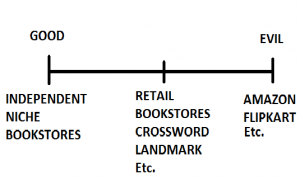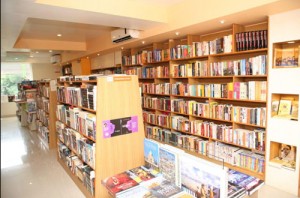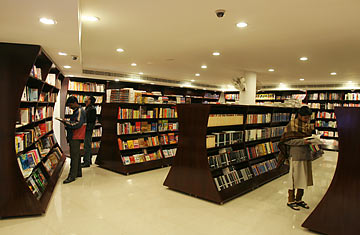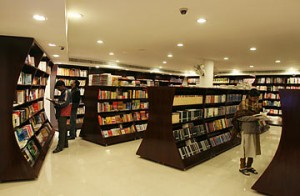In this blog post, Mithun Pillai, a Management Trainee at a Textile Company in Mumbai and a student pursuing his Diploma in Entrepreneurship Administration and Business Laws from NUJS, Kolkata, describes the procedure required to start a bookstore in India with examples.
Introduction
Although the above illustrated ‘Spectrum of Evil’ is made in harmless jest, one cannot deny that there is a grain of truth in the illustration. The emergence of electronic commerce (or online commerce) has had many a Mom-and-Pop bookstores dread facing the seemingly inevitable predicament—how to stay relevant in a business which incentivises convenience; convenience of making a commercial transaction happen within the comfort of one’s home without having to trouble the posterior with movement as such.  This convenience although supremely attainable with a few mouse clicks comes with a trade-off for some souls. For such souls buying a book is a very hands-on process (if you pardon the pun). They need to hold it in their hands, caress the spine, and gently run their fingers through pages as if to see if they respond with the same warmth or more. Then there is the much-romanticized smell of books. All five human senses are involved in confirming the coupling. This esoteric bond that they seek can never be attained over radio waves or indeed fibre optics. Thus, explaining the continued existence of brick-and-mortar book shops in the face of sales onslaught by e-Commerce giants like Amazon and Flipkart.
This convenience although supremely attainable with a few mouse clicks comes with a trade-off for some souls. For such souls buying a book is a very hands-on process (if you pardon the pun). They need to hold it in their hands, caress the spine, and gently run their fingers through pages as if to see if they respond with the same warmth or more. Then there is the much-romanticized smell of books. All five human senses are involved in confirming the coupling. This esoteric bond that they seek can never be attained over radio waves or indeed fibre optics. Thus, explaining the continued existence of brick-and-mortar book shops in the face of sales onslaught by e-Commerce giants like Amazon and Flipkart.
It is many an Indian booklover’s dream to open a bookstore in India which is quite understandable and entirely worthy of a respectable pat on their back. But that love is not nearly enough because what they have to understand is that at the end of the day running a bookstore is exactly what it sounds like, i.e., running a business.
Decide the Market
For the rupee-strapped individual, an online bookstore is a very attractive and feasible option. The limited capital can be conscientiously spent on acquiring books which could be stocked in their house itself. A website can be set-up if the person has the technical know-how; alternately a paid one can be easily arranged for a small amount of money. Online/Social marketing is the next logical step. Channels for payment could be online (via Payment Gateway) or Cash-on-Delivery. For Logistics/Dispatch tie-up with a courier service shouldn’t be too taxing on one’s capital. As discussed before, the online bookstore lacks the intimacy which bookstores can provide so I would like to circumvent this option and try to focus entirely on physical stores with bookshelves and chairs and coffee, etc.
The very first thing to decide shall be the market. We have seen shops selling old, used books. These sell for their budget value, vintage charm or any reason deemed fit by the buyer. Oldies can be sourced either by placing ads online (like a forum/Facebook) or newspaper/magazines. The important thing is that word gets around locally that people could do away with their old books. Second-hand school/college textbooks/guides will always be in great demand. The fringe markets also hold a lot of potential. The key here would be research. For example, Bandra West in Mumbai is home to a sizable number of Christian populace. ‘PAULINE BOOK AND MEDIA CENTER’ in Bandra is one of a kind bookstore which sells books, magazines having Catholic content. Information gathering about niche markets can provide an insight into the demand for niche books.
Market research as discussed above is integral to guarantee footfalls in the shop, but it’s not exclusive. ‘PAULINE’ bookstore may have the most exhaustive content catering to Christians but if it’s not easily accessible due to distance/geography that directly corresponds to fewer footfalls. The key word here is location. This makes much more sense when we realize most of the retail chain bookstores are set up in malls. Malls guarantee sizeable crowds which proportionately convert to more footfalls. Having said that, it must be mentioned that acquiring floor space in malls, especially in cities can be very expensive. Also, retail bookstores are set up for mass consumption. It is an unsaid motto that books purchased in such stores are mostly impulse buys as opposed to independent single bookstores which cater to niche crowds.
Capital
Any business requires capital upfront. However, the amount would decide if one plans to conduct business in lean mode (being conservative with money) or aggressive mode (cash burn).
As mentioned above, if money is scarce conducting business online seems very feasible. Sources to acquire capital are varied and many: first and foremost yourself, family, friends and then investors. The current tech scene in our country has made investors in the form of angel/super angel investors, Private Equity companies, and foreign institutional investors very accessible. If you can pitch your idea convincingly, you might get lucky. The idea has to be structured, and informative for their and your benefit. In business jargon, such a blueprint is called a B-plan.
B-plan ( or Business plan) is a formal plan which sketches your market research, capital requirement, execution plans and financial projection for some future terms (quarterly/semi/annually). Investors typically sit through multiple pitches and thus expect a gist of the plan to make it easier and quicker. All B-plans have an executive summary section contained within just a couple of pages which outlines everything that’s detailed in the plan. It is typically arranged as the first section to be read by the investors and as such should be succinct and reduced to perfection. This is the pitch but only in text form. If the investors are not impressed by the summary, they may even be disinclined to go through the rest of it.
Incorporation of the Bookstore
After the financing/capital  has been taken care, it is time to incorporate the bookstore. Incorporation means making your business a legal entity. Almost all the retail chain bookstores are limited liability companies (and private if I’m not wrong) while the Mom-and-Pop independent ones are proprietorships. This is all very well as when you are a single store the financial returns are comparatively smaller, and so is the liability. While the retail ones deal in a much higher degree of finance and business complexity; this, in turn, increases the liability. Thus, generally speaking, all the revenue that independent stores make becomes their income directly, and so does the losses. They are personally responsible for the liabilities, and their personal belongings (including property/real estate) could come under the legal scanner to resolve the debt incurred. While for the retail ones, every employee draws a salary from the revenue but during a loss, they are protected by virtue of being a limited liability legal entity. Only the corporate assets (but not the personal assets of employees) will be at stake to resolve the debt.
has been taken care, it is time to incorporate the bookstore. Incorporation means making your business a legal entity. Almost all the retail chain bookstores are limited liability companies (and private if I’m not wrong) while the Mom-and-Pop independent ones are proprietorships. This is all very well as when you are a single store the financial returns are comparatively smaller, and so is the liability. While the retail ones deal in a much higher degree of finance and business complexity; this, in turn, increases the liability. Thus, generally speaking, all the revenue that independent stores make becomes their income directly, and so does the losses. They are personally responsible for the liabilities, and their personal belongings (including property/real estate) could come under the legal scanner to resolve the debt incurred. While for the retail ones, every employee draws a salary from the revenue but during a loss, they are protected by virtue of being a limited liability legal entity. Only the corporate assets (but not the personal assets of employees) will be at stake to resolve the debt.
Procurement of Books
The ideal way to go about procuring books would be to purchase them wholesale. Although for niche-targeting bookstores that would be very difficult. Finding good wholesaler/publishers is an important part of market research. In the initial stages of business, one might have to spend money to stock their bookshelves. Once the business proves to be sustainable, they could be persuaded to get the stock on credit. In all probability, they are well-tuned to the current taste and mood of the book-devouring intelligentsia. And as such it’s not a bad idea to pay heed to their suggestions regarding the quality and content that is to be shelved in one’s bookstore. Niche bookstores have to be more proactive in finding the right sources and further to develop and maintain a relationship with them.
Advertising and Other Inter-related Activities
This brings us to the final piece of the jigsaw puzzle which is advertising and other inter-related activities. Apart from the usual billboards, newspaper ads would be to build an online presence on social networks and further the word-of-mouth factor which goes a long way in building a relationship with the customers. So is the practice of ‘hand-selling’ which is to help the customers make a purchase based on their recommendation/suggestion which they trust. To do this one needs to be up-to-date in the going-ons of the book and publishing industry. This helps to give the customer a personal touch which the e-commerce companies can’t hope to do. The activities I mentioned are social gatherings around a certain theme like author readings and signings which in turn helps with the publicity itself.
 Serato DJ Crack 2025Serato DJ PRO Crack
Serato DJ Crack 2025Serato DJ PRO Crack











 Allow notifications
Allow notifications


